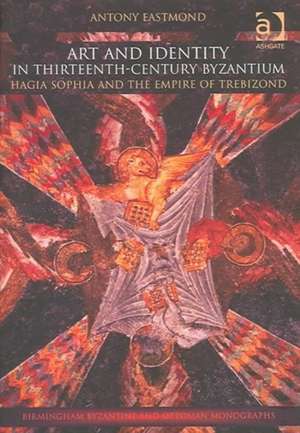Art and Identity in Thirteenth-Century Byzantium: Hagia Sophia and the Empire of Trebizond: Birmingham Byzantine and Ottoman Studies
Autor Antony Eastmonden Limba Engleză Hardback – 20 oct 2004
Din seria Birmingham Byzantine and Ottoman Studies
-
 Preț: 388.46 lei
Preț: 388.46 lei -
 Preț: 325.72 lei
Preț: 325.72 lei -
 Preț: 314.62 lei
Preț: 314.62 lei -
 Preț: 381.98 lei
Preț: 381.98 lei -
 Preț: 397.38 lei
Preț: 397.38 lei - 21%
 Preț: 258.06 lei
Preț: 258.06 lei -
 Preț: 399.29 lei
Preț: 399.29 lei - 18%
 Preț: 1009.91 lei
Preț: 1009.91 lei - 17%
 Preț: 242.74 lei
Preț: 242.74 lei -
 Preț: 373.43 lei
Preț: 373.43 lei - 18%
 Preț: 1003.43 lei
Preț: 1003.43 lei - 23%
 Preț: 328.20 lei
Preț: 328.20 lei -
 Preț: 389.38 lei
Preț: 389.38 lei - 25%
 Preț: 324.16 lei
Preț: 324.16 lei -
 Preț: 404.47 lei
Preț: 404.47 lei - 17%
 Preț: 256.87 lei
Preț: 256.87 lei - 25%
 Preț: 324.16 lei
Preț: 324.16 lei -
 Preț: 398.09 lei
Preț: 398.09 lei - 25%
 Preț: 776.84 lei
Preț: 776.84 lei - 25%
 Preț: 834.82 lei
Preț: 834.82 lei - 27%
 Preț: 766.00 lei
Preț: 766.00 lei -
 Preț: 387.91 lei
Preț: 387.91 lei -
 Preț: 311.41 lei
Preț: 311.41 lei -
 Preț: 469.34 lei
Preț: 469.34 lei -
 Preț: 388.72 lei
Preț: 388.72 lei - 30%
 Preț: 771.95 lei
Preț: 771.95 lei -
 Preț: 405.83 lei
Preț: 405.83 lei - 18%
 Preț: 1062.31 lei
Preț: 1062.31 lei - 18%
 Preț: 1004.72 lei
Preț: 1004.72 lei - 30%
 Preț: 873.95 lei
Preț: 873.95 lei -
 Preț: 489.26 lei
Preț: 489.26 lei
Preț: 741.68 lei
Preț vechi: 1030.53 lei
-28% Nou
Puncte Express: 1113
Preț estimativ în valută:
141.92€ • 154.64$ • 119.59£
141.92€ • 154.64$ • 119.59£
Comandă specială
Livrare economică 02-16 aprilie
Doresc să fiu notificat când acest titlu va fi disponibil:
Se trimite...
Preluare comenzi: 021 569.72.76
Specificații
ISBN-13: 9780754635758
ISBN-10: 0754635759
Pagini: 246
Dimensiuni: 169 x 244 x 25 mm
Greutate: 0.75 kg
Ediția:1
Editura: Taylor & Francis
Colecția Routledge
Seria Birmingham Byzantine and Ottoman Studies
Locul publicării:Oxford, United Kingdom
ISBN-10: 0754635759
Pagini: 246
Dimensiuni: 169 x 244 x 25 mm
Greutate: 0.75 kg
Ediția:1
Editura: Taylor & Francis
Colecția Routledge
Seria Birmingham Byzantine and Ottoman Studies
Locul publicării:Oxford, United Kingdom
Cuprins
Contents: Preface; Introduction: the Byzantine empires in the 13th century; Hagia Sophia and its contexts; Architecture and the construction of identity; Trebizond as imperial capital: ceremonial and processions; Adam, exile and 'Byzantine' culture; Ornamental sculpture and cultural orientation: Trebizond, the Seljuqs, and the Caucasus; Wall paintings and politics: rebuilding empire?; Art, the liturgy and modernity; Manuel I Grand Komnenos: the embodiment of empire; Conclusion; Appendix of rulers; Bibliography; Index.
Notă biografică
Antony Eastmond is Reader in the History of Byzantine Art at the Courtauld Institute of Art, University of London, UK
Recenzii
'This précis of Eastmond's arguments does no justice to the subtlety of his case or the wealth of his examples. I started from a position of scepticism, but found myself following the argument with fascination. I commend this book to all serious students of Byzantine monuments, and Byzantine political theory.' The Anglo-Hellenic Review 'Thorough annotation and indexing, plus a helpful chronological table of regional thirteenth-century rulers, round out a very worthwhile and balanced addition to university and Byzantinophile libraries.' Religion and the Arts ’The book is lucidly written and well structured, using numerous photographs, many of which are in colour, and some useful sketches of the less visible paintings to illustrate the text... it is definitely a good read.’ Art History ’Antony Eastmond writes with authority and clarity... This book [...] is dense and layered but will amply reward the careful reader. The complexity of the subject is eased by abundant illustrations - 102 black and white figures and 21 color plates... The bibliography is a model of its type, and the index is complete and well-ordered.’ Church History ’This long-awaited work is an excellent study of a key monument in Byzantine art and culture. ... The book is lavishly produced with good black and white and coloured photographs. The generous number of the colour plates is eminently laudable. Equipped with useful appendices, indexes and ample annotations, Eastmond's study of the church of St Sophia contributes significantly to the reappraisal of the monument, setting the tone for similar publications/studies and making a lasting contribution to the field.’ Byzantinische Zeitschrift
Descriere
The church of Hagia Sophia in Trebizond, built by the emperor Manuel I Grand Komnenos (1238-63) in the aftermath of the fall of Constantinople to the Fourth Crusade, is the finest surviving Byzantine imperial monument of its period. Art and Identity in Thirteenth-Century Byzantium, with extensive illustrations in colour and black-and-white, provides a new analysis of the architecture, sculptural decoration and extensive wall paintings in the church. Antony Eastmond situates the church in the context of political and cultural developments across the Byzantine world in this turbulent period, and examines questions of cultural interchange on the borders of the Christian and Muslim worlds of eastern Anatolia, the Caucasus and Persia. He argues that a new visualization of Byzantine imperial ideology emerged in Trebizond, determined as much by craftsmen and expectations of imperial power as by imperial decree; and that this was a credible alternative Byzantine identity to that developed in the empire of Nicaea.
